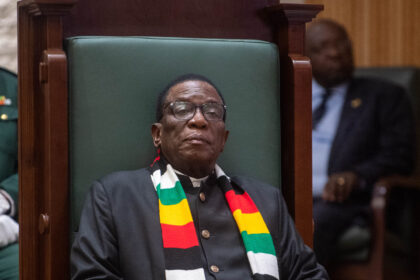By Pearl Matibe in Washington D.C.
The United States Department of State is closely monitoring Madagascar after soldiers in military uniforms took to the streets of the capital, Antananarivo, making public announcements and displaying military force. This action appears to be a coup d’état—a sudden takeover by the military that threatens the country’s government.
Madagascar’s President Andry Rajoelina has disappeared from the public eye since the events began. His current health and location are unknown, raising serious concerns about the country’s future.
On Tuesday, 14 October, a State Department spokesperson said, “The Department of State is monitoring the situation on the ground in Madagascar closely. The security situation remains calm, but the Department remains vigilant to ensure the continued safety and security of our Embassy, personnel, and American citizens in Madagascar. We urge all parties to pursue a peaceful solution in line with the constitutional order.”
The U.S. government has kept a Level 3 Travel Advisory for Madagascar since 27 September, warning Americans, in a Madagascar Travel Advisory, to “reconsider travel due to crime and unrest.” A State Department spokesperson added, “The U.S. Department of State has no higher priority than the safety and security of U.S. citizens.” The advisory notes violent protests, rising crime, and conflicts between security forces and criminal gangs in parts of the country.
At the same time, the Southern African Development Community (SADC), a regional group that includes Zimbabwe, spoke out on 13 October about the crisis in Madagascar. SADC’s Chairperson of the Organ on Politics, Defense and Security Cooperation, President Arthur Peter Mutharika of Malawi, expressed “grave concern” over the coup attempt.
“The recent events threaten the peace, stability, and democratic order of Madagascar,” Mutharika said. He expressed “solidarity with the Government and people of Madagascar” and promised SADC’s support to restore peace and constitutional governance.
The SADC statement also warned of the dire consequences of recent protests, which have caused deaths, injuries, and property damage. Mutharika urged everyone in Madagascar to “exercise maximum calm and restraint,” respect the law, and seek peaceful solutions through dialogue.
He asked law enforcement to act “with professionalism and impartiality” and encouraged citizens to voice their concerns legally and peacefully.
SADC promised to work closely with Madagascar’s leaders and partners in the region to help bring the country back to normal and maintain unity.
For Zimbabwe and neighboring countries, Madagascar’s crisis is a reminder of how fragile peace and governance can be. Zimbabweans know the impact political instability can have. The situation has drawn wide attention, highlighting the need for steady, democratic leadership across southern Africa.
Meanwhile, the U.S. State Department continues urging Americans in Madagascar to stay alert and follow embassy updates. A State Department spokesperson reminded, “We encourage U.S. citizens to stay informed via Embassy alerts and enroll in the Smart Traveler Enrollment Program (STEP) to receive timely safety updates and assistance.”
As troops hold key locations in Madagascar’s capital, the world watches anxiously. The U.S. and SADC both stress the urgent need for a peaceful, lawful end to the crisis. Their messages underline the shared goal for stability, democracy, and peace in the region.
Pearl Matibe is a Washington, D.C.-based geopolitical analyst and correspondent covering Congress, the Pentagon, State Department, and White House, with expertise in foreign and defence policy. Follow her on Twitter: @PearlMatibe.



